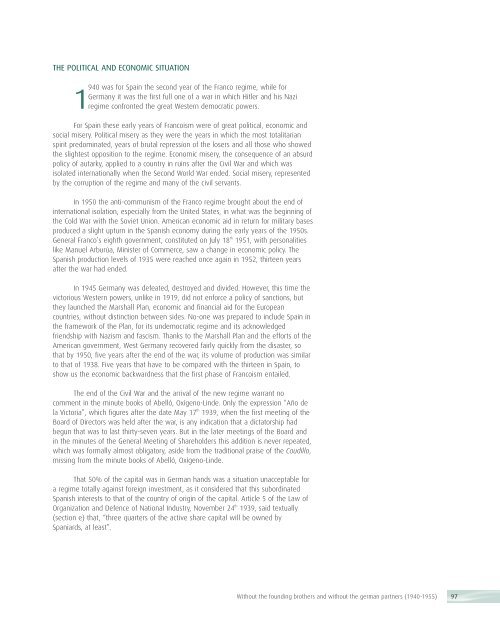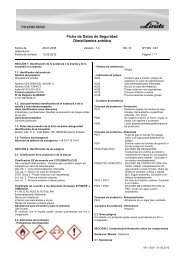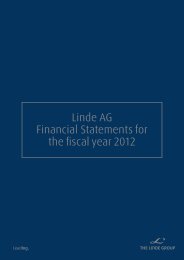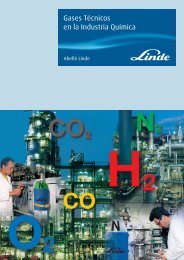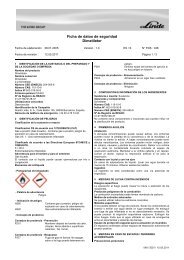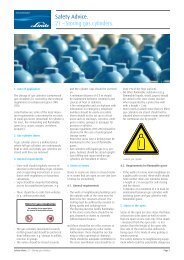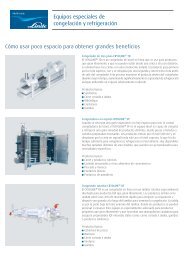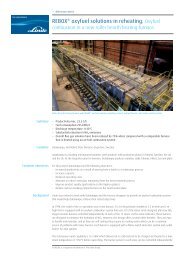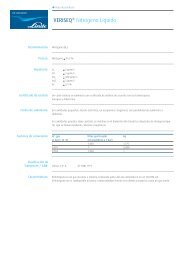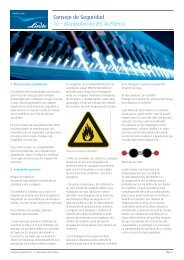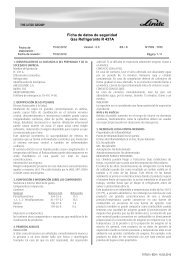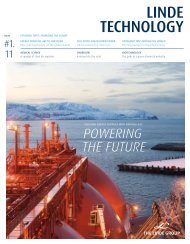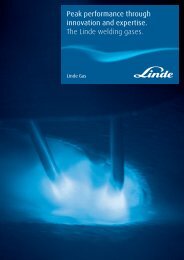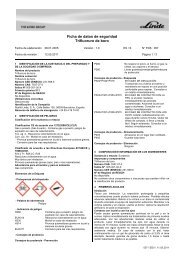Abelló Linde Centenary Book
Abelló Linde Centenary Book
Abelló Linde Centenary Book
Create successful ePaper yourself
Turn your PDF publications into a flip-book with our unique Google optimized e-Paper software.
THE POLITICAL AND ECONOMIC SITUATION<br />
940 was for Spain the second year of the Franco regime, while for<br />
1Germany it was the first full one of a war in which Hitler and his Nazi<br />
regime confronted the great Western democratic powers.<br />
For Spain these early years of Francoism were of great political, economic and<br />
social misery. Political misery as they were the years in which the most totalitarian<br />
spirit predominated, years of brutal repression of the losers and all those who showed<br />
the slightest opposition to the regime. Economic misery, the consequence of an absurd<br />
policy of autarky, applied to a country in ruins after the Civil War and which was<br />
isolated internationally when the Second World War ended. Social misery, represented<br />
by the corruption of the regime and many of the civil servants.<br />
In 1950 the anti-communism of the Franco regime brought about the end of<br />
international isolation, especially from the United States, in what was the beginning of<br />
the Cold War with the Soviet Union. American economic aid in return for military bases<br />
produced a slight upturn in the Spanish economy during the early years of the 1950s.<br />
General Franco’s eighth government, constituted on July 18 th 1951, with personalities<br />
like Manuel Arburúa, Minister of Commerce, saw a change in economic policy. The<br />
Spanish production levels of 1935 were reached once again in 1952, thirteen years<br />
after the war had ended.<br />
In 1945 Germany was defeated, destroyed and divided. However, this time the<br />
victorious Western powers, unlike in 1919, did not enforce a policy of sanctions, but<br />
they launched the Marshall Plan, economic and financial aid for the European<br />
countries, without distinction between sides. No-one was prepared to include Spain in<br />
the framework of the Plan, for its undemocratic regime and its acknowledged<br />
friendship with Nazism and fascism. Thanks to the Marshall Plan and the efforts of the<br />
American government, West Germany recovered fairly quickly from the disaster, so<br />
that by 1950, five years after the end of the war, its volume of production was similar<br />
to that of 1938. Five years that have to be compared with the thirteen in Spain, to<br />
show us the economic backwardness that the first phase of Francoism entailed.<br />
The end of the Civil War and the arrival of the new regime warrant no<br />
comment in the minute books of Abelló, Oxígeno-<strong>Linde</strong>. Only the expression “Año de<br />
la Victoria”, which figures after the date May 17 th 1939, when the first meeting of the<br />
Board of Directors was held after the war, is any indication that a dictatorship had<br />
begun that was to last thirty-seven years. But in the later meetings of the Board and<br />
in the minutes of the General Meeting of Shareholders this addition is never repeated,<br />
which was formally almost obligatory, aside from the traditional praise of the Caudillo,<br />
missing from the minute books of Abelló, Oxígeno-<strong>Linde</strong>.<br />
That 50% of the capital was in German hands was a situation unacceptable for<br />
a regime totally against foreign investment, as it considered that this subordinated<br />
Spanish interests to that of the country of origin of the capital. Article 5 of the Law of<br />
Organization and Defence of National Industry, November 24 th 1939, said textually<br />
(section e) that, “three quarters of the active share capital will be owned by<br />
Spaniards, at least”.<br />
Without the founding brothers and without the german partners (1940-1955) 97


